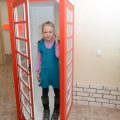Who to be? For children this is a very difficult question. After all, they know very little about the world and themselves. Parents often render a disservice: they focus on their own, rather than on children's interests, insist that it is supposedly prestigious, but not to the child's liking. In general, they embody their own ambitions in children. Experts of the online school "Foxford" gave their advice to readers of Wday.ru - they told how to help the child determine the choice and not do harm. Photo: Getty Images
Photo: Getty Images
Preschoolers and junior students: do not expect a result from the child
Children aged 4 to 7 can be entertained for weeksthe same: sculpting, dancing, building towers or babysitting dolls. This does not mean that you need to send your child to an art or dance studio, a Lego club or a parenting school. A child who is persistently interested in something and shows obvious abilities from the age of three is rather an exception to the rule. Usually, children try everything they can reach, and from time to time they are enthusiastically engaged in one thing. Do not be afraid of ruining talent, be afraid of drowning out the child's inner voice with excessive busyness. It is not without reason that sanitary rules and regulations for kindergartens prescribe that preschoolers play completely freely for 3-4 hours a day. Parents often try to occupy their child with "more useful" activities: English lessons, rhythm, Zaitsev cubes - all this should be in moderation. In free play, a child develops imagination, self-control, attention and memory in the healthiest and most natural way. What is the value of knowledge of English without the courage to speak or the ability to read without imagination? The first two, or even all four years of primary school are spent learning how to study – preparing for the transition to the middle level. At the same time, the student begins or continues to play sports, music, creativity in clubs and sections, makes first friends. It happens that a boy decides to quit karate to go to football with a new friend. Or a girl wants to leave choreography for clay modeling. Rarely a parent will agree to this – of course, so many years have been invested in classes, belts, medals and diplomas are behind them. Should you persuade the child to stay to develop character? Or give him freedom of choice? Both for parents of small children and for parents of primary school students there is one piece of advice: maintain interest, not choice. Let the child see that what is important to you is not karate or football, but his health, agility and skill. Let your daughter know that you admire her grace and want her to remain energetic and flexible, but let her make a choice. Sculpting will not replace physical activity, but gymnastics, yoga, capoeira or figure skating are quite good. If your child has a new interest - drawing, chess, robotics or sewing - support her with words, buy materials and a subscription to a studio, praise her for her successes, but do not expect results. The more the child tries, the better she will understand herself. Only those who know how to listen to themselves and have received enough impressions can choose their own path. The child will try and look for their interest in high school. Adolescence is a time of experiments, so be patient and be ready to support your child's hobbies. Photo: Getty Images
Photo: Getty Images
Adolescents and high school students: only a serious practice
It seems like a joke about lawyers and economistsnot long left. Rectors of Moscow universities note that in 2017, many graduates chose engineering specialties and information technology. And rightly so, because these areas are the basis of half of the professions of the future. When choosing a specialty, a high school student faces three key problems: - heard about different professions, but only has a good idea of \u200b\u200bthose that he has seen in life and in films; - does not know what personal and physical qualities are needed in a specific job; - incorrectly assesses his abilities and interests. In order for your child to make an informed choice of the future, meetings with interesting people and excursions to a Christmas tree toy factory are not enough. It is necessary for the schoolchild to try on the profession and receive feedback from a specialist. Children under 14 years old are suitable for educational and entertainment cities of professions, and high school students need serious practice. Three methods are suitable here. 1. Career guidance camp Middle and high school students get acquainted with professions in educational vacation camps. For example, in a robotics camp, schoolchildren master engineering and programming like real masters - they make useful robots. Some are inspired by robotics, while others understand that the tempting profession is not suitable for them. But all participants in the shift learn how robots help people in medicine, production, education, and better understand the world of the future. Another promising area is information technology. Do not worry if your schoolchild never lets go of his gadget. Perhaps, in the next 2-3 years, he will master one of the Internet professions. In IT-oriented camps, children work under the guidance of programmers, project managers, designers and SMM specialists. The world has changed, and a smartphone in some hands is a silly toy, and in others - a working tool. The main advantage of an educational camp is the opportunity to get acquainted with several different specialties within one direction and understand how much this or that job suits a teenager. Well, and conversations with experts, of course. Photo: Getty Images2.Tutoring Sometimes a child chooses a profession based on their favorite subject and gets disappointed. After all, school mathematics is one thing, and university courses and problems solved by an engineer, marketer or programmer are something completely different. It can also be the other way around: a child has chosen a profession, but doubts that he will pass the entrance exam in a difficult subject. To understand whether a student can handle advanced physics and how many points he will get in Russian, contact a tutor. One or two years before the Unified State Exam, an experienced teacher will help you deal with difficulties, instill confidence in yourself and prepare you for the exam most effectively. If it is difficult to find a suitable tutor in your city, study online via Skype. This is often cheaper than in-person classes. 3. Internship during the holidays Graduates in Europe and the USA allow themselves a free year after school to work and see the world. This is not customary in Russia, especially since young men can be drafted into the army. But according to Russian law, a teenager over 14 years old has the right to work with the consent of their parents - a great chance to take a closer look at some profession during the holidays. Before you arrange for your child to do an internship at a friend's bakery, talk to him. Perhaps your enterprising schoolchild is already earning a lot of money on cryptocurrency, coding bots for Telegram or promoting his own YouTube channel.
Photo: Getty Images2.Tutoring Sometimes a child chooses a profession based on their favorite subject and gets disappointed. After all, school mathematics is one thing, and university courses and problems solved by an engineer, marketer or programmer are something completely different. It can also be the other way around: a child has chosen a profession, but doubts that he will pass the entrance exam in a difficult subject. To understand whether a student can handle advanced physics and how many points he will get in Russian, contact a tutor. One or two years before the Unified State Exam, an experienced teacher will help you deal with difficulties, instill confidence in yourself and prepare you for the exam most effectively. If it is difficult to find a suitable tutor in your city, study online via Skype. This is often cheaper than in-person classes. 3. Internship during the holidays Graduates in Europe and the USA allow themselves a free year after school to work and see the world. This is not customary in Russia, especially since young men can be drafted into the army. But according to Russian law, a teenager over 14 years old has the right to work with the consent of their parents - a great chance to take a closer look at some profession during the holidays. Before you arrange for your child to do an internship at a friend's bakery, talk to him. Perhaps your enterprising schoolchild is already earning a lot of money on cryptocurrency, coding bots for Telegram or promoting his own YouTube channel.









